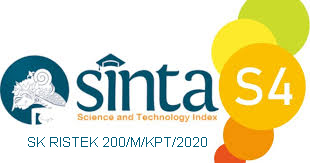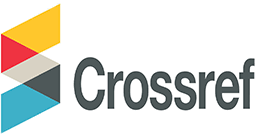Prediction of the COVID-19 Vaccination Target Achievement with Exponential Regression
Abstract
The achievement of the national COVID-19 vaccination target in Indonesia is often reported to be uncertain with various existing obstacles. Prediction with exponential regression modeling is done by adopting part of the SKKNI Data Science with the stages of Data Understanding, Data Preparation, Modeling, Model Evaluation. The vaccination dataset from the Ministry of Health of the Republic of Indonesia for the period from January 13, 2021 to October 10, 2021, was randomly separated into training data of 0.8 parts and testing data of 0.2 parts. The optimal parameters of the exponential function are found using the scipy.optimize library in IPython. The model obtained was evaluated using MAE, RMSE, and R-Squared metrics on normalized training data, training data, test data, and recent data for seven days from 11 to 17 October 2021. The prediction results show that the vaccination target will be achieved 100 percent on January 18, 2022, while on December 31, 2021, only 80 percent will be achieved. From the recent data, it appears that more acceleration is needed, especially if it is desired to be achieved in December 2021 as determined by President Joko Widodo, there will be a shortfall of 20 percent based on the prediction results.
Keywords
Full Text:
PDFReferences
Satuan Tugas Penanganan COVID-19, “208.265.720 Orang Target Sasaran Vaksinasi COVID-19 di Indonesia,” 2021. https://covid19.go.id/p/vaksin/208265720-orang-target-sasaran-vaksinasi-covid-19-di-indonesia.
Kompas, “Sulit Kejar Target Vaksinasi Covid-19, Menkes: Kami Butuh Bantuan Pemda dan Swasta,” 2021. https://megapolitan.kompas.com/read/2021/06/02/13554891/sulit-kejar-target-vaksinasi-covid-19-menkes-kami-butuh-bantuan-pemda-dan-swasta.
L. A. Amar, A. A. Taha, and M. Y. Mohamed, “Prediction of the final size for COVID-19 epidemic using machine learning: A case study of Egypt,” Infect. Dis. Model., vol. 5, 2020, doi: 10.1016/j.idm.2020.08.008.
C. C. Zhu and J. Zhu, “Spread trend of COVID-19 epidemic outbreak in China: Using exponential attractor method in a spatial heterogeneous SEIQR model,” Math. Biosci. Eng., vol. 17, no. 4, 2020, doi: 10.3934/MBE.2020174.
S. R. Al-Dawsari and K. S. Sultan, “Modeling of daily confirmed Saudi COVID-19 cases using inverted exponential regression,” Math. Biosci. Eng., vol. 18, no. 3, 2021, doi: 10.3934/MBE.2021117.
V. K. Sharma and U. Nigam, “Modeling and Forecasting of COVID-19 Growth Curve in India,” Trans. Indian Natl. Acad. Eng., vol. 5, no. 4, 2020, doi: 10.1007/s41403-020-00165-z.
A. Senapati, A. Nag, A. Mondal, and S. Maji, “A novel framework for COVID-19 case prediction through piecewise regression in India,” Int. J. Inf. Technol., vol. 13, no. 1, 2021, doi: 10.1007/s41870-020-00552-3.
I. G. B. Ngurah Diksa, “Peramalan Gelombang Covid 19 Menggunakan Hybrid Nonlinear Regression Logistic – Double Exponential Smoothing di Indonesia dan Prancis,” Jambura J. Math., vol. 3, no. 1, 2021, doi: 10.34312/jjom.v3i1.7771.
N. H. A. S. Al Ihsan, H. H. Dzakiyah, and F. Liantoni, “Perbandingan Metode Single Exponential Smoothing dan Metode Holt untuk Prediksi Kasus COVID-19 di Indonesia,” Ultim. J. Tek. Inform., vol. 12, no. 2, 2020, doi: 10.31937/ti.v12i2.1689.
C. M. Gibran, S. Setiyawati, and F. Liantoni, “Prediksi Penambahan Kasus Covid-19 di Indonesia Melalui Pendekatan Time Series Menggunakan Metode Exponential Smoothing,” J. Inform. Univ. Pamulang, vol. 6, no. 1, 2021, doi: 10.32493/informatika.v6i1.9442.
Kementrian Ketenagakerjaan Republik Indonesia, “SKKNI Keahlian Artificial Intelligence (Data Science),” 2020. https://skkni.kemnaker.go.id/tentang-skkni/dokumen?area=data science&limit=20&page=1.
Kementrian Kesehatan Republik Indonesia, “Vaksinansi COVID-19 Nasional,” 2021. https://vaksin.kemkes.go.id/#/vaccines.
J. D. Hunter, “Matplotlib: A 2D graphics environment,” Comput. Sci. Eng., vol. 9, no. 3, pp. 90–95, 2007, doi: 10.1109/MCSE.2007.55.
R. Torres, “Mathematical Investigation of Functions,” J. Educ. Manag. Dev. Stud., vol. 1, no. 1, 2021, doi: 10.52631/jemds.v1i1.6.
P. Virtanen et al., “SciPy 1.0: fundamental algorithms for scientific computing in Python,” Nat. Methods, vol. 17, no. 3, pp. 261–272, 2020, doi: 10.1038/s41592-019-0686-2.
P. Fernando and E. G. Brian, “IPython: A System for Interactive Scientific Computing,” Comput. Sci. Eng., vol. 9, no. 3, pp. 21–29, 2007.
S. Lakshmanan, “How, When, and Why Should You Normalize / Standardize / Rescale Your Data?,” Towards AI — The Best of Tech, Science, and Engineering, 2019. https://towardsai.net/p/data-science/how-when-and-why-should-you-normalize-standardize-rescale-your-data-3f083def38ff.
J. Hale, “Which Evaluation Metric Should You Use in Machine Learning Regression Problems?,” Towords Datascience, 2020. https://towardsdatascience.com/which-evaluation-metric-should-you-use-in-machine-learning-regression-problems-20cdaef258e.
DOI: https://doi.org/10.31326/jisa.v4i2.1051
Refbacks
- There are currently no refbacks.
Copyright (c) 2021 Teja Endra Eng Tju, Dian Sa’adillah Maylawati, Ghifari Munawar, Suharjanto Utomo

This work is licensed under a Creative Commons Attribution-ShareAlike 4.0 International License.
JOURNAL IDENTITY
Journal Name: JISA (Jurnal Informatika dan Sains)
e-ISSN: 2614-8404, p-ISSN: 2776-3234
Publisher: Program Studi Teknik Informatika Universitas Trilogi
Publication Schedule: June and December
Language: English
APC: The Journal Charges Fees for Publishing
Indexing: EBSCO , DOAJ, Google Scholar, Arsip Relawan Jurnal Indonesia, Directory of Research Journals Indexing, Index Copernicus International, PKP Index, Science and Technology Index (SINTA, S4) , Garuda Index
OAI address: http://trilogi.ac.id/journal/ks/index.php/JISA/oai
Contact: jisa@trilogi.ac.id
Sponsored by: DOI – Digital Object Identifier Crossref, Universitas Trilogi
In Collaboration With: Indonesian Artificial Intelligent Ecosystem(IAIE), Relawan Jurnal Indonesia, Jurnal Teknologi dan Sistem Komputer (JTSiskom)
JISA (Jurnal Informatika dan Sains) is Published by Program Studi Teknik Informatika, Universitas Trilogi under Creative Commons Attribution-ShareAlike 4.0 International License.


















